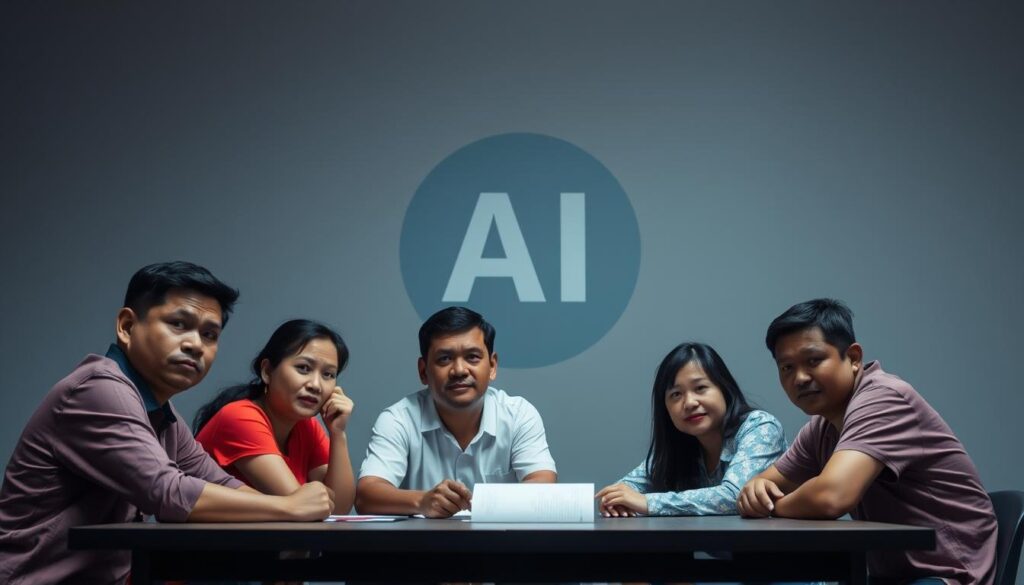Have you ever thought about how fair your AI systems are? Artificial Intelligence in decision-making is a big challenge: overcoming AI bias. Algorithms can sometimes favor one group over others based on race, gender, or age. It’s important to understand these biases to stop discrimination and inequality.
As we explore AI bias solutions, we see how crucial ethical AI decisions and responsible AI development are. They help make technology more fair and equal for everyone.
In Southeast Asia, more businesses are using AI. But, biases in these systems can affect many people. Without working to make AI unbiased, companies might lose the trust of their diverse customers. Fixing this issue is key to building trust and equality in AI.
Key Takeaways
- AI bias can lead to discrimination based on race and gender.
- Addressing bias through diverse data collection is crucial.
- Human oversight and supervision mitigate bias in AI systems.
- Transparent AI algorithms promote fair results.
- Ethical guidelines ensure responsible AI development practices.
Understanding AI Bias: A Growing Concern
AI bias is a big deal today. It shows how old biases can affect new tech. This issue is seen in many areas, like healthcare and finance. It can lead to unfair treatment and discrimination.
In healthcare, biased AI can mean some people don’t get the right treatment. This can lead to lawsuits and hurt the trust between doctors and patients. It’s a big problem.
The finance world also struggles with AI bias. For example, unfair credit scoring can deny loans to certain groups. This can lead to legal trouble and harm the company’s reputation.
AI can make decisions fast, which makes bias even worse. It’s important to make sure AI is fair for everyone. Companies need to test their AI to make sure it’s working right for all people.
As AI gets better, we need to watch it closely. We must make sure it’s fair and not biased. This is key to keeping AI safe and trustworthy.
How AI Bias Affects Decision-Making
The AI bias effects are big in many areas, changing how we make decisions and who gets hurt. In jobs, justice, and health, biased AI can harm groups that are already struggling. For example, AI can unfairly treat women and people of color, showing we need to make AI fair.
In hiring, AI can unfairly judge women, making it hard for them to get jobs in fields mostly men work in. This shows we need AI to be fair. A careful plan, like testing medicines, could help find and fix these biases early.
Studies show that AI can be unfair if it’s trained on bad data, making things worse for groups that are not well-represented. This unfair AI can keep old problems going, affecting jobs and health care.

AI can show old biases, like facial recognition wrongly picking out people from certain groups, leading to wrong arrests. In money matters, unfair AI can deny loans, hurting a company’s image. Fast AI decisions can spread unfair effects across many areas.
Using a clear plan to check for bias in AI can help companies make fairer choices. By focusing on making AI fair, companies can reduce harm and create a fairer world. It’s key to know AI has bias before we try to fix it to make decisions fair.
Common Sources of Bias in AI Systems
It’s key to know the sources of AI bias to fix its impact on making decisions. A big reason for bias is data collection bias. Many projects use old data, which can be biased. This can lead to wrong predictions because some groups are missing from the data.
Also, using flawed datasets makes things worse. The National Institute of Standards and Technology (NIST) found facial recognition tech works less well for darker skin tones. This means it’s more likely to say someone is not who they are, showing how important it is to have diverse data.
Algorithmic bias adds to the problem. For example, the COMPAS system in the U.S. criminal justice system was found to unfairly label African-American defendants as high-risk. An AI system for predicting patient mortality also gave African-American patients higher-risk scores, even if their health was the same as others.
Generative AI models like StableDiffusion and DALL-E also show bias. They often show corporate leaders as men and link criminality to people of color. This can make harmful stereotypes worse.
To fight these sources of AI bias, new methods are being used. Oversampling and making synthetic data are helping to make training datasets more balanced. Also, picking models that are fair across different groups is becoming more common.
As we learn more about algorithmic bias, we need to keep talking about data ethics and fairness. Companies must understand the effort needed to prepare data. They also need to keep checking and updating AI systems to keep them fair.
The Importance of Diverse Data Collection
Diverse data collection is key to making AI systems fair. It ensures data sets include many different groups. This helps reduce bias in AI, making it more accurate and fair.
Studies show AI models do 20% better with diverse data. This is important because 78% of AI experts say biased data mirrors human biases. Yet, 87% of companies struggle to keep their data diverse and accurate.
Companies that focus on ethical data governance gain trust from stakeholders by up to 50%. In finance, for example, about 60% of AI tools show bias in decisions. It’s vital to keep checking AI systems for bias to avoid ethical problems.

Using diverse data helps fix AI’s biases. It improves AI’s performance and reduces harm to groups left out of data. For AI to be truly fair, companies need to use a wide range of data sources.
AI Bias Solutions: Strategies for Mitigating Bias
AI technology is now used in many areas, and we need to tackle bias head-on. As AI makes more decisions, finding good solutions for bias is key. Companies must create plans to fight bias in AI from start to finish.
This means using strong tests for bias and picking AI tools that are fair. It’s important to do this early on in AI development.
Implementing Bias Testing Procedures
Testing AI for bias is crucial. It helps find and fix biases in AI systems. By checking algorithms often, companies can make sure AI is fair and just.
These checks help find biases early, making AI more ethical. They also make AI systems more open and fair.
Utilizing Unbiased AI Tools in Development
Choosing the right AI tools is very important. Tools that help avoid bias are key in making AI fair. These tools help balance data, making AI systems more just.
Using these tools helps companies follow ethical AI practices. It leads to more diversity and inclusion in their work.
Ethical AI Decisions: Establishing Guidelines
As artificial intelligence grows, making ethical choices is key. AI systems can sometimes spread biases and make things unfair. It’s important to create strong AI guidelines to make sure tech is both legal and ethical.
AI must be developed in a way that considers its impact on society. This means looking at how AI works and how it affects people.
Frameworks for Responsible AI Development
Creating ethical frameworks is vital for AI to be used right. These frameworks help companies follow best practices and be open and accountable. Groups like UNESCO have made big steps in this area.
UNESCO has agreed on a global AI ethics plan. It aims to protect human rights and dignity as tech advances.
The Future of Life Institute also played a big role. They set up the Asilomar AI Principles. These rules help deal with the risks and challenges AI brings. They focus on the ethical side of AI to ensure it’s used wisely.
| Framework | Key Focus Areas | Responsible Parties |
|---|---|---|
| UNESCO AI Ethics Agreement | Human rights, dignity | Governments, NGOs |
| Asilomar AI Principles | Risks, challenges of AI | Tech companies, researchers |
| NSTC Report | A.I. governance, economy, security | Public sector, policymakers |
| Internal Company Guidelines | Compliance, ethical use of AI | Private companies |
Working together, we can make AI choices that are ethical. This teamwork is key to handling AI’s complex issues. By doing this, we can create a future where AI helps society, not hurts it.

Case Studies of AI Bias in Real-World Applications
Recent studies on AI bias show how biased algorithms affect different areas. In bias in hiring, Amazon stopped using a tool in 2018. It favored male applicants over females. This shows how algorithms can keep old biases alive, leading to unfair hiring.
In healthcare, AI systems have big challenges. They often don’t have enough data from all groups. For example, some AI systems gave worse results to black patients than white ones. This is a big problem in healthcare AI challenges, as it could lead to unfair treatment.
At Carnegie Mellon University, research found Google’s ads mostly showed high-paying jobs to men. This shows how real-world AI applications can quietly keep old stereotypes alive. It affects who gets certain jobs.
In criminal justice, the COMPAS algorithm has been criticized for its racial bias. It wrongly said black defendants were more likely to be criminals than white ones. These examples teach us important lessons from AI bias incidents. They show we need to check and fix AI systems fast.
Studies on generative AI also found problems. AI often shows older professionals as men, keeping gender stereotypes alive. This affects not just hiring but how people are seen in work.
As we talk more about AI ethics, these examples remind us of the need to fix AI bias. We must work towards a fairer future.
Unbiased AI Tools: Advancements in Technology
The growth of unbiased AI tools is a big step in fighting AI bias. These tools aim to make AI systems fair and ethical. Companies like IBM and Microsoft are at the forefront, offering AI fairness tools to tackle AI bias.
IBM’s AI Fairness 360 toolkit helps developers find and fix bias in AI. This is crucial for making AI systems work well and fairly.
In Southeast Asia, businesses are starting to see the value of ethical AI tools. Startups are using unbiased AI to make sure their systems are fair. This is important because AI bias can make social problems worse.
Many companies now focus on being open and responsible with their AI. Unbiased AI tools improve technology and build trust with users. They are constantly being updated to meet new AI rules and social standards.

Training Human Reviewers: The Human Touch
As AI becomes key in many fields, training human reviewers is crucial. They ensure AI works right, avoiding biases. For example, in the criminal justice system, AI tools like COMPAS can lead to unfair outcomes. African-American defendants were labeled as “high-risk” more often than whites.
The value of the importance of human touch in AI is clear. Humans bring context, empathy, and ethics. Studies by Joy Buolamwini and Timnit Gebru showed facial analysis tech has big racial and gender biases. This shows we need strong ways to fix these biases.
Companies that focus on training human reviewers do better with AI. A tech firm stopped working on a hiring tool because it unfairly treated women’s college graduates. This shows the power of human oversight. The World Economic Forum says tech can either help or hurt workers, making human review even more important.
In fast-changing markets like Southeast Asia, combining AI with human skills helps avoid biases. Studies say AI can make decisions more fairly by reducing personal opinions. This leads to better results.
| Application | Findings | Importance |
|---|---|---|
| AI in Criminal Justice | Higher risk scores for African-American defendants | Need for training human reviewers to manage outcomes |
| Facial Recognition | Error rates vary significantly by race and gender | Bias correction mechanisms required |
| Hiring Algorithms | Penalized women from women’s colleges | Emphasizes human oversight in algorithm development |
| Financial Services | Improved underwriting for underserved applicants | Human touch can guide fair practices |
Building Trust Through Transparency and Explainability
AI is now a big part of many industries, and trust in AI is key. To make users trust AI, AI transparency is crucial. It helps users understand how algorithms work and why AI makes certain decisions.
About 65% of leaders in customer experience see AI as vital. They know it’s important to clearly share what AI can do. Without clear info, 75% of businesses worry that customers might leave.
As worries about AI’s fairness grow, explainability in AI systems becomes more important. The European Union’s GDPR rules make companies open about how they use data. Companies like Zendesk also work to make AI easier to understand.
Transparency is about more than just algorithms. It’s about how AI interacts with users and the broader society. By talking to everyone involved, companies can build trust. They use tools like SHAP and LIME to show how AI works.
Creating a culture of openness helps build trust in AI. It tackles problems like racial bias and ethical concerns. As companies get better at checking their AI and following rules, people will feel more confident in AI’s role in our lives.
AI Bias Solutions, Ethical AI Decisions, Unbiased AI Tools
Organizations must focus on solving AI bias to make ethical decisions. AI bias can affect healthcare, hiring, and finance. It’s crucial to use unbiased AI tools to make fair decisions.
In healthcare, a study showed an algorithm was biased against black patients. Researchers and Optum worked together to cut this bias by 80%. This shows how important it is to improve AI responsibly.
Improving AI fairness means using diverse data. This makes AI systems more accurate. Also, we need to keep checking and updating AI models to keep them fair.
Companies should create rules for using AI ethically. These rules help keep AI fair and transparent. This builds trust in AI technology.
Using unbiased AI tools and making fair AI decisions is key. Working with diverse teams helps spot and fix biases. Leaders in Southeast Asia can lead the way to a fair AI future.
Conclusion
Dealing with AI bias is key to building trust and fairness in our tech world. We need to take steps like using diverse data and unbiased AI tools. This is very important in places like Southeast Asia, where leaders should invest in making AI fair.
Creating ethical AI futures means more than just tech. It’s about education, talking to stakeholders, and following rules. By being open and accountable, we can make AI work for everyone, not just some.
We all need to work together to make AI fair and effective. The talk about AI’s impact on society is crucial. We must make sure AI is a tool for everyone, not just a few.

